Suchergebnisse für "Factsheet%3A Energietechnologien gestalten%2C die f%C3%BCr alle sinnvoll und nutzbar sind"
Netzwerk Bauökologie für Krankenanstalten
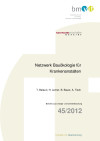
Schriftenreihe
45/2012
T. Belazzi et al.
Herausgeber: BMVIT
Deutsch, 114 Seiten
Downloads zur Publikation
Windenergienutzung in Schigebieten daWindSchi
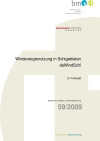
Schriftenreihe
59/2009
O. Frühwald
Herausgeber: BMVIT
Deutsch, 59 Seiten
Downloads zur Publikation
Tagungsband des Startworkshops
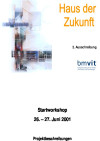
Herausgeber: BMVIT
Deutsch, 20 Seiten
Downloads zur Publikation
Tagungsband des Startworkshops
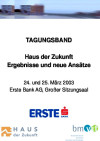
Herausgeber: BMVIT
Deutsch, 102 Seiten
Downloads zur Publikation
WOP - Wohnbausanierung mit Passivhaustechnologie
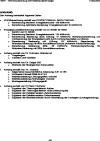
Schriftenreihe
39/2006
A. Prehal, H. Poppe
Deutsch, 132 Seiten
Downloads zur Publikation
Windintegration unterstützt duch Lastmanagement
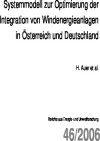
Schriftenreihe
46/2006
H. Auer
Deutsch, 164 Seiten
Downloads zur Publikation
Innovativer Mottenschutz für Schafwolldämmstoffe
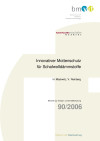
Schriftenreihe
90/2006
H. Mackwitz, V. Reinberg
Herausgeber: BMVIT
Deutsch, 114 Seiten
Downloads zur Publikation
Technologieplattform Photovoltaik Österreich
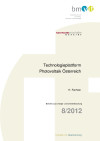
Schriftenreihe
08/2012
H. Fechner
Herausgeber: BMVIT
Deutsch, 52 Seiten
Downloads zur Publikation
Integral Resource Optimization
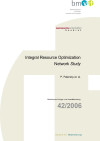
Schriftenreihe
42/2006
P.Palensky
Deutsch, 121 Seiten
Downloads zur Publikation
Akzeptanzverbesserung von Niedrigenergiehaus-Komponenten
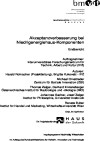
Schriftenreihe
26/2001
H. Rohracher, B. Kukovetz, M. Ornetzeder, et.al.
Deutsch, 336 Seiten
Downloads zur Publikation
Informationsfolder Impulsprogramm Nachhaltig Wirtschaften

Herausgeber: BMVIT
Deutsch
Passivhaustauglicher Scheitholzofen kleiner Leistung
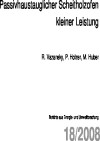
Schriftenreihe
18/2008
R. Vazansky, P. Holzer, M. Huber
Herausgeber: BMVIT
Deutsch, 54 Seiten
Downloads zur Publikation
KityVR - Artificial intelligence techniques to implement CityGML models and VR visualization
The KityVR project deals with key research aspects at the interface between 3D city models and virtual reality. It addresses questions such as how virtual reality can be used for visualization in the field of 3D city models and how machine learning and statistical methods can be used to enrich or complete energy-related data sets.
Circular Twin - A Digital Ecosystem for the Generation and Evaluation of Circular Digital Twins
By 2030, more than the equivalent of two Earths will be needed to meet the demand for natural resources, therefore a transition to circular systems is essential, especially in the construction industry. The digital "Circular Twin" ecosystem enables the early implementation of circular economy goals as well as end-to-end digitalization in construction utilizing Digital Twins, Generative Design Algorithms and Virtual Reality.
BIGMODERN - Subproject 5: Feasibility studies about innovative technical solutions
The application of innovative technologies means additional planning and coordination effort which usually cannot be incorporated into the conventional planning processes of the BIG. To overcome these barriers for the application of innovative technologies, the sub project at hand aims at preparing information, feasibility studies, planning records, experiences and practical examples in a way, that they can be implemented directly into the planning process.
BIGMODERN - Subproject 2: Demonstration project of an official building in Bruck
In the frame of this subproject being part of the flagship project BIGMODERN, a decision matrix as well as a handbook for planning, including feasibility analysis and a collection of information, serving as decision guidance for planning and implementation of sustainable building refurbishment, is being developed. In this way, the risk for planners and builders of the usage of new sustainable technologies shall be minimised.
Development of a method and an innovative machine for the industrial application of environmentally friendly, mineral oil free lubricants in deep drawing processes
Eliminating the usage of mineral oil based lubricants in deep drawing processes by an innovative machine for clean application of environmentally friendly wax-based forming emulsions.
Data-based processes for the creation and formulation of production data for complex industrial plants.
Development and evaluation of a process to automatically create models from existing production data of industrial plants. These models can be used to optimize the production process and plant equipment (scrap, quality, use of raw materials and energy) or to detect and predict faults.
Valuation models for future energy clusters considering market, technology and policy uncertainty - Case Study Biomass
Market liberalization, technological change and increasing complexity of international policy processes (e .g. climate negotiations) necessitate new approaches to evaluating investments in an uncertainty and risk-augmented framework. This project developed valuation methods from financial theory - such as real options valuation and portfolio optimization - to quantify the relative competitiveness of bioenergy chains and total energy systems.
ThermoCluster - Heat generation from infrastructure projects and integration into decentralised low-temperature heating and cooling networks for plus-energy districts
Integrative assessment of the geothermal potential of the Brenner base tunnel and the northern portal area, and the subsequent distribution of the heat generated from these sources to the end-consumer in potential plus-energy districts of the city of Innsbruck.
